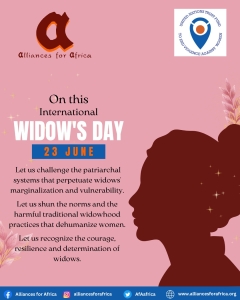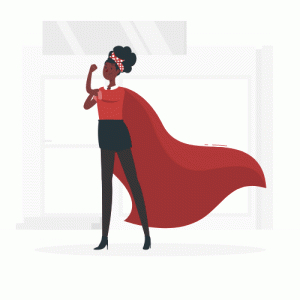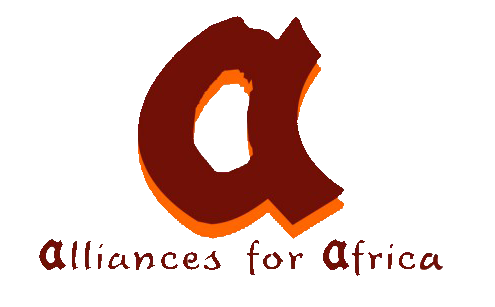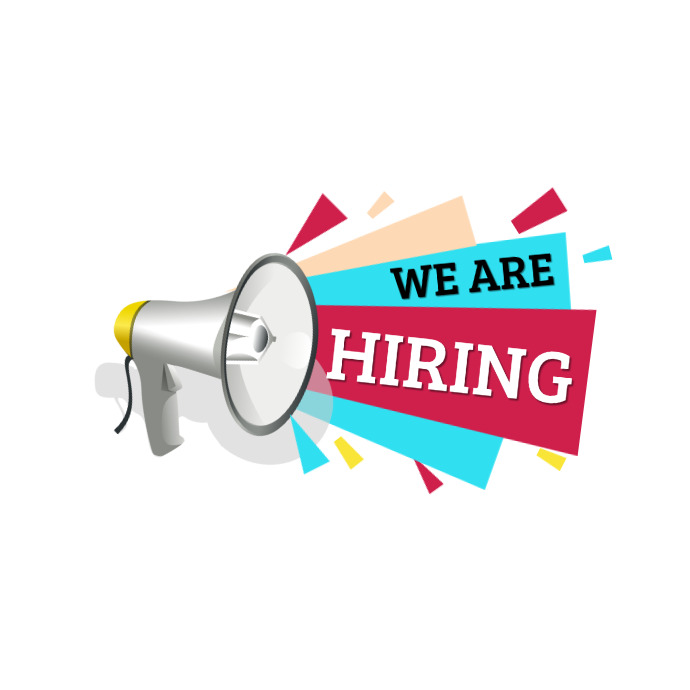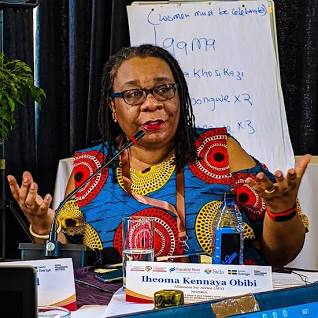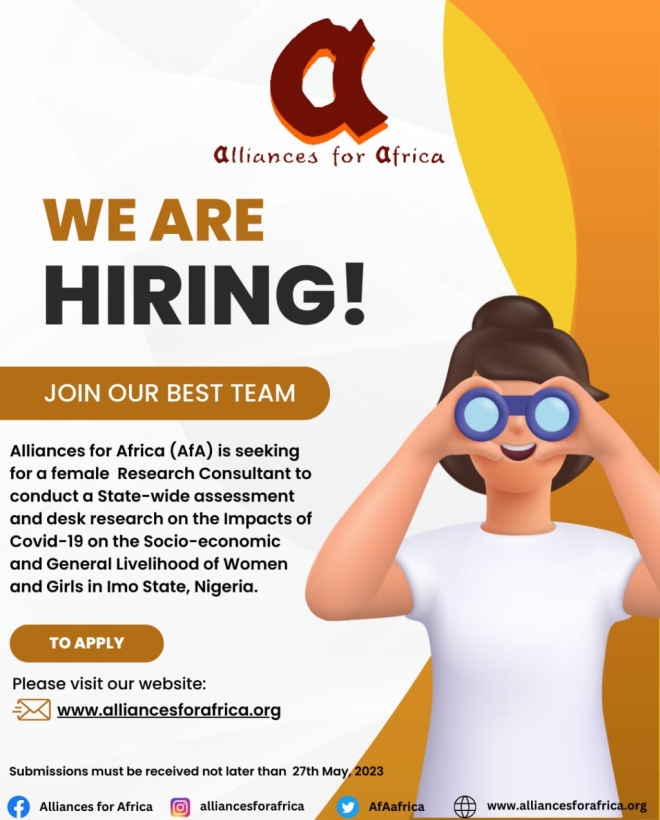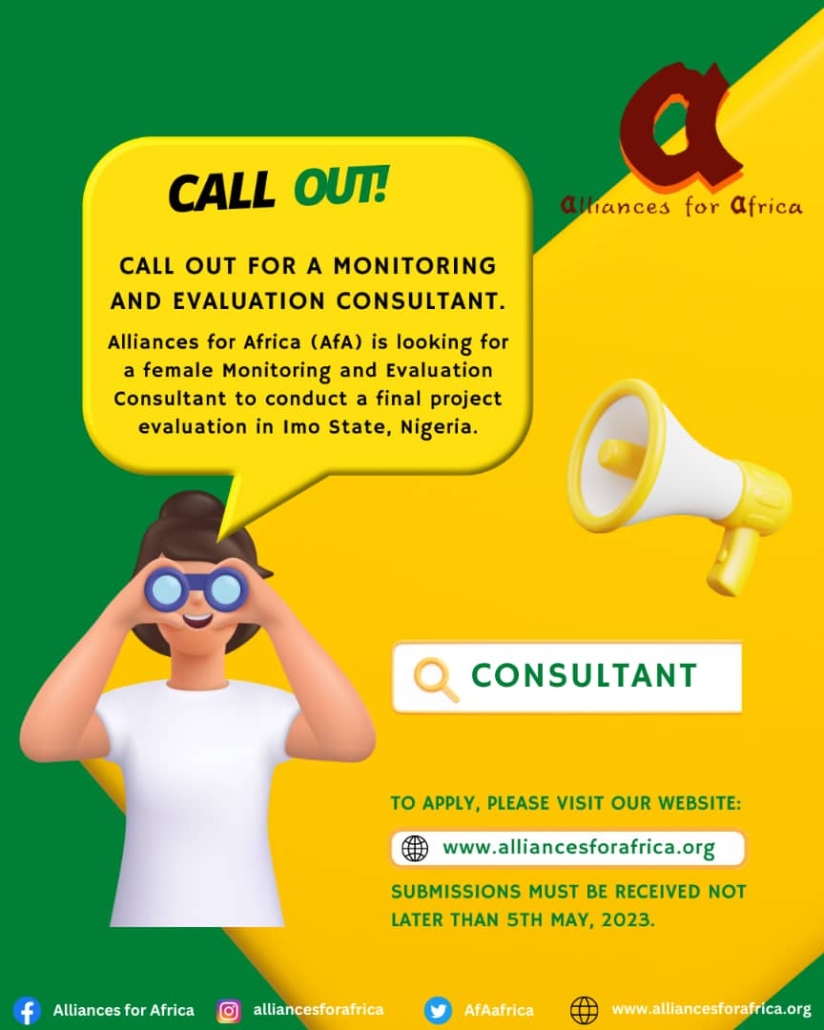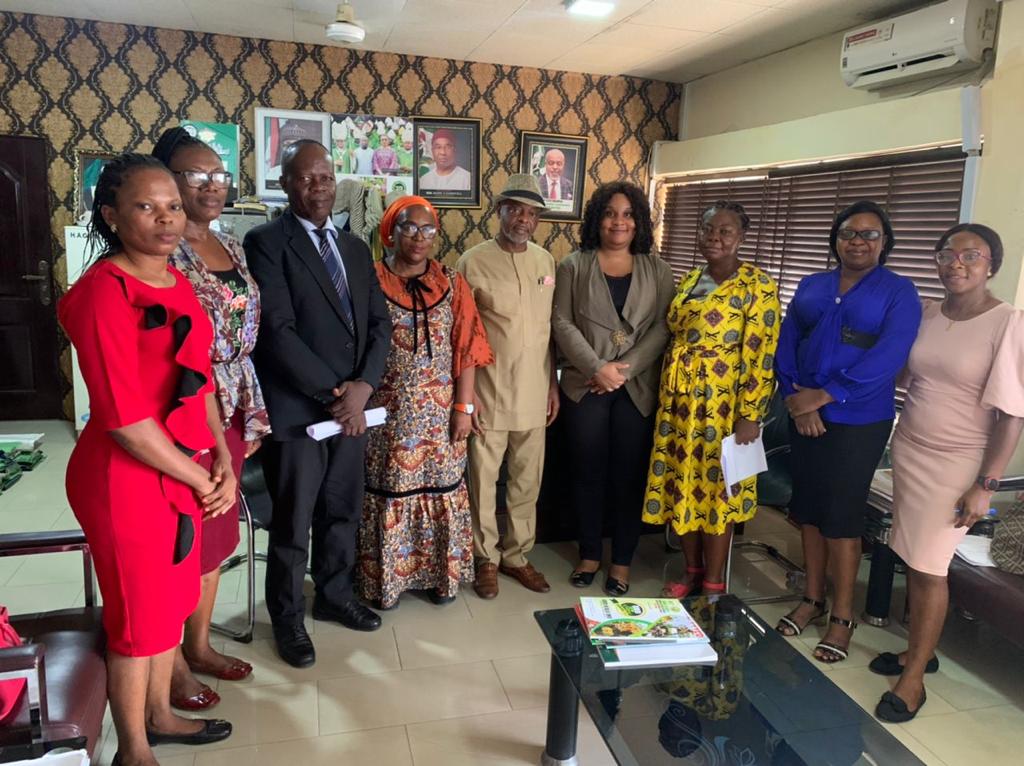FINAL EVALUATION & MONITORING OF ALLIANCES FOR AFRICA (AfA) PROJECT WITH FUNDING SUPPORT BY UNTF FOR EVAWG
PROJECT TITLE: Strengthening Stakeholder’s Engagement in the process of VAPP enactment and Implementation
DURATION OF THE PROJECT: 3years
Project starting date: 01/01/2020
Project end date: 31/12/2022
SCOPE: 27 LGA and 640 Communities in the Imo State. The evaluation shall be conducted in some randomly selected LGAs and communities as samples. He/she shall as well carry out evaluation on 20% of the beneficiaries randomly picked from the selected LGAs (total number to be worked out with the evaluator).
A. BACKGROUND OF THE ISSUE:
In Imo State, Violence Against Women and Girls (VAWG) has taken root and grown into a giant oak tree with frightening dimensions that seem to be constantly fed by our inactions, non-availability of a legal frame work and mere righteous indignation. The failure of the state government to effectively address these issues as state security and human rights issues affect the rights of citizens in nearly every sphere of national life. In our project state, many women and girls are either victims or survivors of harmful cultural practices, sexual violence and harassment, physical violence, psychological violence, intimate partner violence, human trafficking and political violence and there is a near neglect of the issue and lack of will to even discuss it.
With the deeper social media penetration, the increase and cancerous spread of VAWG has been awakened with the circulation of incidents of rape, child molestation, violence perpetrated by state actors, cultural practices that are harmful and sexual offences on female students by members of the academic staff in several universities. All reports reviewed agree that the increase in VAWG in Imo State is as a result of non-existing legislation (VAPP) for legal action, so offenders perpetrate VAWG, get away and crime continues to spread in dimensions. In light of these problems identified in the communities, we realized some specific context that promote VAWG in Imo State which are the culture of silence perpetrated by religious and cultural beliefs, lack of political will to address VAWG as a human rights issue and a lack of collaboration among institutions responsible for VAWG in the state. Therefore, with this realization, this intervention came in place to address the problems identified through promoting effective legislation, activism for zero tolerance to VAWG in Imo State and a coordinated effort among government institutions and civil society organizations towards prevention and response to VAWG.
This forms the bases for this project and the need call for evaluation to ascertain the level of project impact.
B. CONTEXTUAL ANALYSIS OF THE PROJECT:
The increasing reports of VAWG generated from women and girls, police, media, National Human Rights Commission, MDG’S and CSO’s in Imo State and the social media presented itself as an opportunity to push for a domestic law as a call to action to end VAWG in the state through the enactment of the Violence Against Persons Prohibition (VAPP) as a framework for addressing the issues.
- Organization: Alliances for Africa (AfA)
- Project title: Strengthening Stakeholder’s Engagement in the process of VAPP enactment and Implementation.
- Project duration: 3 Years
- Budget and expenditure: TBD
- Geographical areas: Imo State, South-Eastern Nigeria
- Specific forms of violence addressed by the project: The specific forms of violence to be addressed by this project are: Gender Based Violence (GBV) and Sexual Gender based violence (SGBV).
- Main objectives of the project: The two main strategic objectives of the project are:
- To evaluate performance and impact of the UNTF Project;
- To highlight learnings and sustainable plans.
- Key assumptions of the project:
- There is wide range of sexual and gender-based violence against women and girls in Imo State.
- There exist harmful cultural practices against girls and women in the state.
- There is culture of silence and gender injustice and absence of legislative framework to redress these issues.
- There are little/no institutions responsible for addressing violence against women and girls (VAWG) leading to unimproved effectiveness to prevent and respond to VAWG.
- Description of targeted primary and secondary beneficiaries:
- The primary beneficiaries of the project are; female political activists/human rights defenders, women and girls in general, women/girls’ survivors of violence, women/girl’s victims of sexual exploitation.
- The secondary beneficiaries are; members of civil society organizations (including NGOs), members if community-based organizations, government officials.
- Key implementing partners and stakeholders:
The key implementing partners and stakeholders include; UN Women, National Human Rights Commission (NHRC), State Ministry of Gender and Social Development, External Consultants, National Orientation Agency (NOA), NAPTIP, FIDA, Child Protection Network, Police, CSOs, media.
- As well as the strategy and theory of change/results chain:
The strategy deployed included the PAP (Prevention, Activism and Policy) pattern which is grouped into four actionable strategies:
Strategy 1: identify and engage with existing VAPP Networks and smaller women’s movements at community levels; Conduct a baseline / capacity needs assessment of the networks/members; establish 27 LGA and 3 senatorial zonal coordinators; establish a data collation and monitoring components for their engagement in the LGAs; develop advocacy manual; endline on VAPP process.
Strategy 2: VAPP Network members will identify and engage with strategic traditional, religious and LG level legislators.
Strategy 3: this involved media component from the beginning to the end.
Strategy 4: this involved Documentary and Documentation on VAWG for women and girls.
Result: the project achieved the enactment and implementation of VAPP in the 27 local government areas and 604 communities in Imo State.
ACHIEVEMENTS OF THE PROJECT:
Some of the achievement of the project include the following;
- The project has successfully established a state body known as Imo State Committee on Ending Violence Against Women and Girls (ISCEVAWG) and their capacity to function as expected increased.
- The Violence Against Persons Prohibitions (VAPP) has been enacted in the state through the resilient effort of the ISCEVAWG members to curb incessant cases of violence in the state.
- In addition, the project has contributed to developing the state directory on institutions working around women and girls which was missing, this is a coordinated approach to ensure women and girls are aware of the first point of call when they are abused and violated
C. PURPOSE OF THE EVALUATION:
The purpose of the evaluation is to document learnings, cross-check if the objectives of the project are achieved, and hopefully serve as a utility for the organization, to learn lessons to inform future projects and operations, having in mind goals and objectives of the project as guide.
D. OBJECTIVES OF THE EVALUATION:
The two mandatory objectives as per the guidance are:
- To evaluate the entire project (01/01/2020 – 01/12/2022) against the effectiveness, relevance, efficiency, sustainability, knowledge generation and impact criteria as well as the cross-cutting gender equality and human rights criteria.
- To identify key lessons and promising or emerging good practices in the field of ending violence against women and girls, for learning purposes.
Other objectives as set by Alliances for Africa (AfA) for more in-depth focus are:
- To evaluate performance and impact of the UNTF Project;
- To highlight learnings and sustainable plans.
e. CRITERIA AND EVALUATION QUESTIONS: To evaluate the entire project (insert dates), against the effectiveness, relevance, efficiency, sustainability, knowledge generation and impact criteria, as well as the cross-cutting gender equality and human rights criteria;
i. Effectiveness
A measure of the extent to which a project attains its objectives / results (as set out in the project document and results framework) in accordance with the theory of change.
- To what extent were improved access for women and girls to essential, safe and adequate multi-sectoral services to end VAWG?
ii. Relevance
The extent to which the project is suited to the priorities and policies of the target group and the context.
- To what extent do the cases of violence against women and girls are effectively and/or often reported, investigated and/or prosecuted?
iii. Efficiency
Measures the outputs – qualitative and quantitative – in relation to the inputs. It is an economic term which refers to whether the project was delivered cost effectively.
- To what extent was the improved prevention of VAWG through changes in behaviour, practices and attitude?
iv. Sustainability
Sustainability is concerned with measuring whether the benefits of a project are likely to continue after the project/funding ends.
- To what extent will the community, youth and other groups mobilize people to change behaviour, attitudes and practices with regard to women and girls’ legal/human rights and take action to prevent VAWG?
v. Impact
Assesses the changes that can be attributed to a particular project relating specifically to higher-level impact (both intended and unintended).
- To what extent has the increased effectiveness of legislation, policies, national action plans and accountability system to prevent and end VAWG?
vi. Knowledge generation
Assesses whether there are any promising practices that can be shared with other practitioners.
- To what extent has the institutions responsible for addressing VAWG improve effectiveness to prevent and respond to VAWG?
vii. Gender equity and Human Rights
Assess the level of gender imbalances and human rights abuses has been checked in program implementing communities.
- To which extent human rights based and gender responsive approaches were incorporated through-out the project?
G. METHODOLOGY TO USE:
The Evaluator shall apply both qualitative and quantitative measures to achieve the desired result which shall reflect the outcome of the project.
The external consultants applying for the role must propose the evaluation design and methodology in their proposal/application.
However, the external evaluator shall apply different forms of data sourcing which include but not limited to the following; interviews, fieldworks, surveys, etc. However, he/she shall discuss with the organization on the data sources and the data tools (including data collecting tools), bearing in mind the organization’s area of intervention which is humanitarian. A comprehensive data design modalities shall be submitted by the evaluator.
EVALUATION ETHICS:
The evaluation must be carried out in accordance with the principles outlined in the UNEG evaluation guidelines (which impartiality and independence, transparency, etc.). ’The evaluator must have a plan in place to:
- Protect the rights of respondents, including privacy and confidentiality especially those of women and girls;
- Elaborate on how informed consent will be obtained and to ensure that the names of individuals consulted during data collection will not be made public;
- If the project involves children (under 18 years old) the evaluator/s must consider additional risks and need for parental consent;
- The evaluator/s must be trained in collecting sensitive information and specifically data relating to violence against women and select any members of the evaluation team on these issues.
- Data collection tools must be designed in a way that is culturally appropriate and does not create distress for respondents;
- Data collection visits should be organized at the appropriate time and place to minimize risk to respondents;
- The interviewer or data collector must be able to provide information on how individuals in situations of risk can seek support (referrals to organizations that can provided counselling support, for example).
H. KEY DELIVERABLES OF THE EVALUATOR AND TIMEFRAME: This exercise is for 28 days.
|
No.
|
Deliverable
|
Deadlines of Submission to UN Trust Fund M&E Team
|
Responsible
|
Deadline
|
Timeframe
|
|
1
|
Evaluation Inception Report
|
This report should be submitted by the evaluator within 2-4 weeks of starting the assessment. The inception report needs to meet the minimum requirements and structure specified in the evaluation guidelines.
|
Evaluation Task Manager, Stakeholder Group and UNTF
|
21 Working Days
|
By 5th June 2023
|
|
2
|
Draft Evaluation Report
|
In accordance with the timeline agreed with the evaluator hired by the grantee, however it is recommended that the report is submitted no later than 2 weeks (10 working days) before the final evaluation is due. The Draft Report needs to meet the minimum requirements and structure specified in the evaluation guidelines.
|
Evaluation Task Manager, Stakeholder Group and UNTF
|
10 Working days
|
By August 14th
2023
|
|
3
|
Final Evaluation Report
|
No later than 2 months after the project end date to UN Trust Fund. The Final Report needs to meet the minimum requirements and structure specified in this guideline for UN Trust Fund’s review and approval.
|
Evaluation Task Manager, Stakeholder Group and UNTF
|
2 months after the project end date to UN Trust Fund
|
By 30th August. 2023
|
I. SELECTION CRITERIA:
Key requirements for evaluators and the selection / recruitment process:
Final project evaluations must be conducted by external evaluator(s).
External evaluators can be local consultant(s) and/or international consultant(s) or a firm.
Evaluator(s) must be independent from any organizations that have been involved in designing, executing, managing or advising any aspect of the project that is the subject of the evaluation and any other UN Trust Fund-funded projects.
M&E officer(s) and/or other staff members within the grantee organization or implementing partners can NOT be the evaluators for this evaluation.
The core members of the team / lead evaluator must be experienced evaluators.
The evaluation team should be selected taking into account the required competencies, diversity of perspectives and accessibility to the local population.
For projects working on VAW it may not be appropriate for a male evaluator to speak to female beneficiaries.
Data collection visits should be organized at the appropriate time and place to minimize risk to respondents;
The interviewer or data collector must be able to provide information on how individuals in situations of risk can seek support (referrals to organizations that can provided counselling support, for example)
J. QUALIFICATION AND ELIGIBILITY:
Required Qualifications and Experience of the Expert
The expert will be required to have;
- A Bachelor’s Degree in faculty of Humanities and Social Sciences
- Minimum of three years working experience in a similar field.
- Proven practical experience using previous works of analysis.
K. CRITERIA REQUIREMENTS FOR THE EVALUATOR:
Under the direct supervision of the M&E officer and the Programs Manager, the consultant will be required to;
- Develop simplified tools to measure progress in line with outcomes of the project, experiences of the organization as well as partners and beneficiaries
- Support in the drafting of the Project inception report, draft evaluation report and final evaluation report
- Be available to attend meetings; virtual and in-person during the planning and concluding processes of the project.
L.
|
No.
|
Deliverable
|
Deadlines of Submission to UN Trust Fund M&E Team
|
Responsible
|
Deadline
|
Timeframe
|
|
1
|
Evaluation Inception Report
|
This report should be submitted by the evaluator within 2-4 weeks of starting the assessment. The inception report needs to meet the minimum requirements and structure specified in the evaluation guidelines.
|
Evaluation Task Manager, Stakeholder Group and UNTF
|
21 Working Days
|
By 5th June 2023
|
|
2
|
Draft Evaluation Report
|
In accordance with the timeline agreed with the evaluator hired by the grantee, however it is recommended that the report is submitted no later than 2 weeks (10 working days) before the final evaluation is due. The Draft Report needs to meet the minimum requirements and structure specified in the evaluation guidelines.
|
Evaluation Task Manager, Stakeholder Group and UNTF
|
10 Working days
|
By August 14th
2023
|
|
3
|
Final Evaluation Report
|
No later than 2 months after the project end date to UN Trust Fund. The Final Report needs to meet the minimum requirements and structure specified in this guideline for UN Trust Fund’s review and approval.
|
Evaluation Task Manager, Stakeholder Group and UNTF
|
2 months after the project end date to UN Trust Fund
|
By 30th August.
2023
|
M. EVALUATION REPORT:
Submit/retire the final reports of the process to the M and E officer at AfA, meeting the minimum requirements and time schedule. Kindly refer below for details on reporting schedule.
|
No.
|
Deliverable
|
Deadlines of Submission to UN Trust Fund M&E Team
|
Responsible
|
Deadline
|
Timeframe
|
|
1
|
Evaluation Inception Report
|
This report should be submitted by the evaluator within 2-4 weeks of starting the assessment. The inception report needs to meet the minimum requirements and structure specified in the evaluation guidelines.
|
Evaluation Task Manager, Stakeholder Group and UNTF
|
21 Working Days
|
5th June 2023
|
|
2
|
Draft Evaluation Report
|
In accordance with the timeline agreed with the evaluator hired by the grantee, however it is recommended that the report is submitted no later than 2 weeks (10 working days) before the final evaluation is due. The Draft Report needs to meet the minimum requirements and structure specified in the evaluation guidelines.
|
Evaluation Task Manager, Stakeholder Group and UNTF
|
10 Working days
|
August 14th
2023
|
|
3
|
Final Evaluation Report
|
No later than 2 months after the project end date to UN Trust Fund. The Final Report needs to meet the minimum requirements and structure specified in this guideline for UN Trust Fund’s review and approval.
|
Evaluation Task Manager, Stakeholder Group and UNTF
|
2 months after the project end date to UN Trust Fund
|
By 30th August.
2023.
|
Application Procedure
Applicants are required to submit the following:
- A cover letter stating why you are suitable for the consultancy linking your experiences to our objective needs – not more than two pages;
- Updated CV highlighting qualifications and experience in similar projects of not more than two pages;
- Work references – contact details (e-mail addresses) of referees (organisations for whom you’ve produced similar assignments);
- For virtual submissions, kindly submit using the emails provided above and send attaching all relevant documents in PDF format.
Submissions must be received no later than 5th May, 2023. All submissions should be made via afa@alliancesforafrica.org copy to blessing@alliancesforafrica.org
